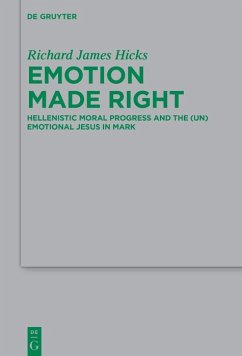Prominent Hellenistic moralists from ca. the first century CE warn that all emotions carry temptation(s) to sin or error. To be guilty of emotional sin is to allow psychosomatic feelings (or rising emotion) free reign to trump godly (rational) guidance of behavioral pursuits. Thus, morally minded Hellenists widely view unemotional behavior as a sign of moral progress. Emotive language peppers the Markan narrative, inviting moral assessments, yet scholarship has seldom delved into a historical-literary analysis of Jesus's emotional characterization. This study proposes a working definition of emotion apropos the narratival nature of Hellenistic emotion theory. It finds that Jesus consistently vanquishes emotional temptations with "battle" techniques similar to those championed by the moralists. Mark characterizes Jesus in the moral tradition of the anti-emotional exemplar, and several minor characters are liberated from destructive emotions through the mercy of Jesus's godly rationale. By recognizing the Markan Jesus as a model, this study outlines a method for persevering in emotional testing that modern readers might also emulate to resist temptation with divine help.
Dieser Download kann aus rechtlichen Gründen nur mit Rechnungsadresse in A, B, BG, CY, CZ, D, DK, EW, E, FIN, F, GR, HR, H, IRL, I, LT, L, LR, M, NL, PL, P, R, S, SLO, SK ausgeliefert werden.


